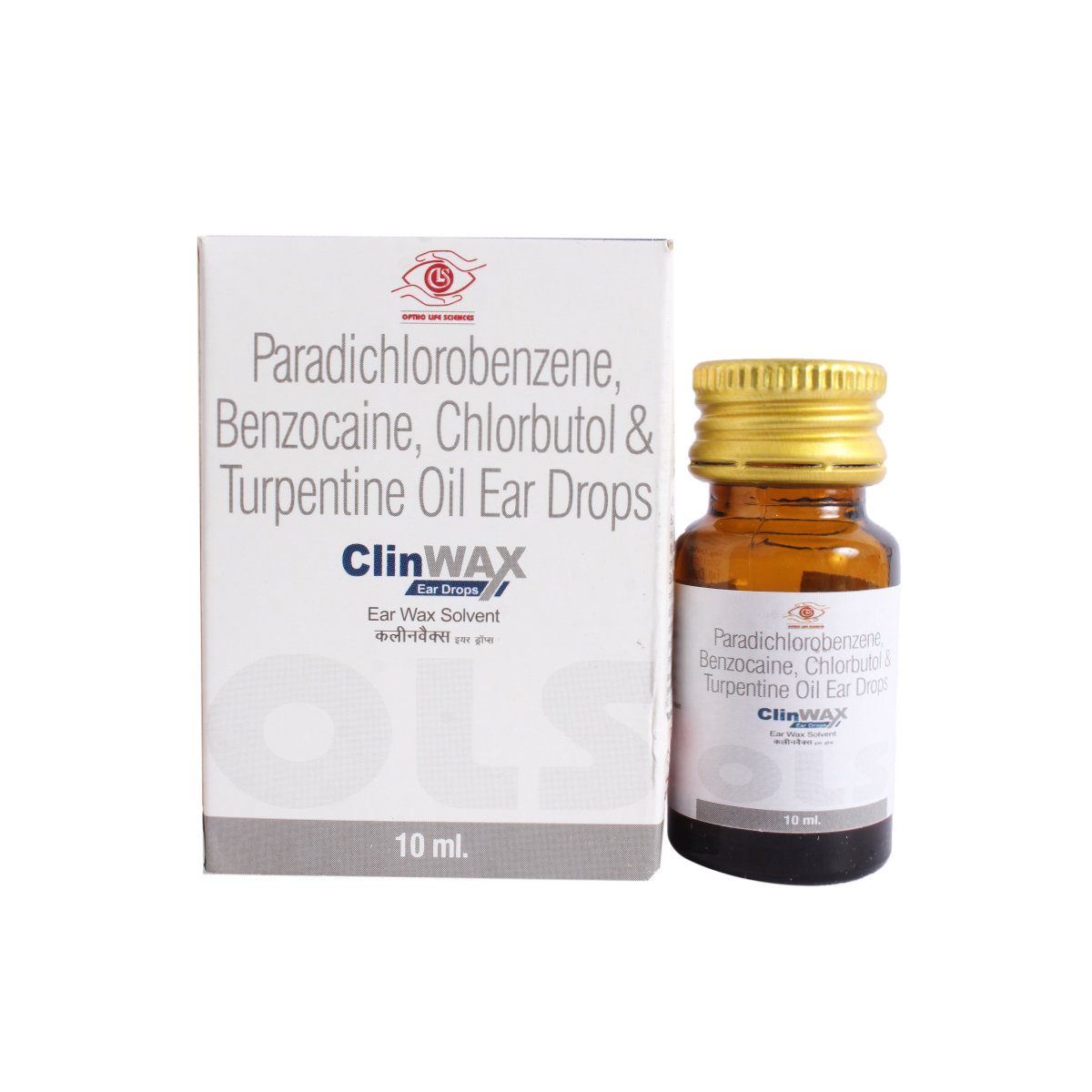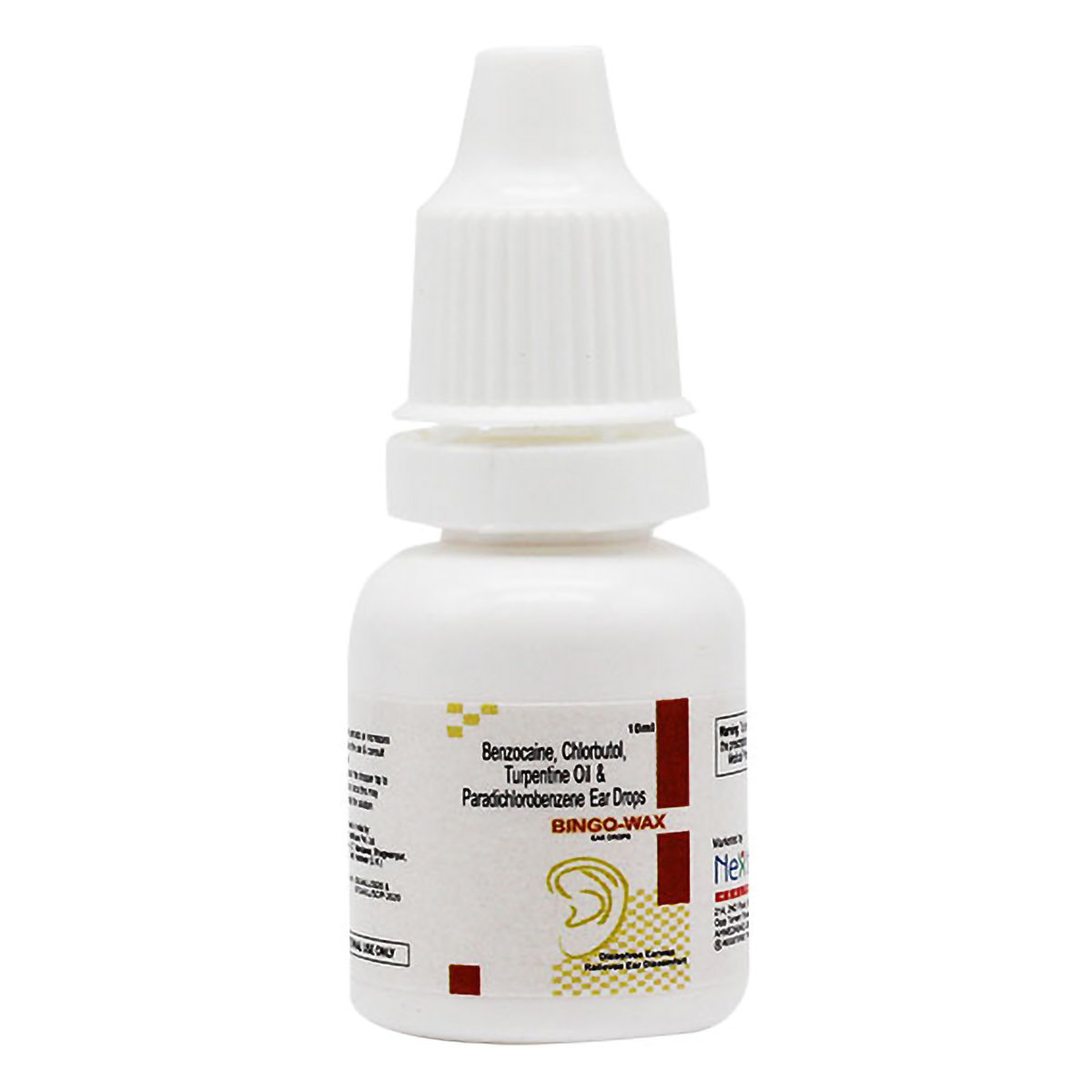Paradichlorobenzene+benzocaine+chlorbutol+turpentine Oil
About Paradichlorobenzene+benzocaine+chlorbutol+turpentine Oil
Benzocaine+chlorbutol+paradichlorobenzene+turpentine Oil belongs to the class of medications called ‘Otic agents’ used to soften the impacted earwax. Earwax build-up occurs due to an ear infection, inflammation, injury, or other conditions such as bone deformations in the ear, skin diseases such as eczema (skin inflammation), or narrowed ear canals.
Benzocaine+chlorbutol+paradichlorobenzene+turpentine Oil contains Paradichlorobenzene, Benzocaine, Chlorbutol, and Turpentine oil. Paradichlorobenzene acts as a hydrating agent. It softens the ear wax by reducing its thickness. Benzocaine acts as a local anaesthetic and prevents pain. Chlorbutol acts as a wax softener. Turpentine oil acts as a lubricating agent. Together, Benzocaine+chlorbutol+paradichlorobenzene+turpentine Oil helps soften the ear wax.
Benzocaine+chlorbutol+paradichlorobenzene+turpentine Oil is for otic (ear) use only. The common side-effects of Benzocaine+chlorbutol+paradichlorobenzene+turpentine Oil are difficulty sleeping, skin irritation, redness, and headache. These side-effects are usually mild and temporary that doesn’t require medical attention. However, inform your doctor if any of these side effects persist or worsen.
Do not use Benzocaine+chlorbutol+paradichlorobenzene+turpentine Oil if you are allergic to any of its contents; if you have inflamed ear canal, perforated eardrum, or eczema (skin inflammation) on the outer ear. It is not recommended for use in children below 1 year of age. Consult your doctor if you are pregnant or breastfeeding. Inform your doctor regarding other prescription, non-prescription or herbal medicines you are taking to prevent any side effects/interactions.
Uses of Paradichlorobenzene+benzocaine+chlorbutol+turpentine Oil
Medicinal Benefits
Benzocaine+chlorbutol+paradichlorobenzene+turpentine Oil is a combination of four medicines: Paradichlorobenzene, Benzocaine, Chlorbutol, and Turpentine oil. Paradichlorobenzene acts as a hydrating agent. It softens the ear wax by reducing its thickness. Benzocaine acts as a local anaesthetic and prevents pain by blocking the pain signals. Chlorbutol acts as a wax softener and an antibacterial. Turpentine oil acts as a lubricating agent and aids in the removal of earwax. Thereby, Benzocaine+chlorbutol+paradichlorobenzene+turpentine Oil can effectively soften the earwax without pain, discomfort, or any requirement of difficult procedures.
Directions for Use
Storage
Side Effects of Paradichlorobenzene+benzocaine+chlorbutol+turpentine Oil
- Difficulty to sleep
- Headache
- Skin irritation
- Redness
Drug Warnings
Do not use Benzocaine+chlorbutol+paradichlorobenzene+turpentine Oil if you notice any swelling, discharge from the ears, or tinnitus (ringing sounds in the ears), as it may indicate ear inflammation. While instilling the ear drops, do not push the dropper into the ear. Benzocaine+chlorbutol+paradichlorobenzene+turpentine Oil is not recommended for use in children below one year of age. Before taking Benzocaine+chlorbutol+paradichlorobenzene+turpentine Oil, inform your doctor if you have hearing problems (including deafness), intestinal problems (including blockage, swelling, ulcers), kidney problems, myasthenia gravis (neuromuscular disease), and Parkinson's disease. Consult your doctor if you are pregnant or breastfeeding.
Drug Interactions
Drug-drug interactions: No interactions found.
Drug-food interactions: No interactions found.
Drug-disease interactions: Benzocaine+chlorbutol+paradichlorobenzene+turpentine Oil should not be used in patients with the inflamed ear canal, perforated eardrum, and eczema (skin inflammation) on the outer ear.
Drug-Drug Interactions Checker List:
Safety Advice

Alcohol
cautionIt is not known whether Benzocaine+chlorbutol+paradichlorobenzene+turpentine Oil interacts with alcohol. Please consult your doctor.

Pregnancy
cautionPlease consult your doctor if you are pregnant; your doctor will prescribe only if the benefits outweigh the risks.

Breast Feeding
cautionPlease consult your doctor if you have any concerns regarding this, your doctor will decide whether Benzocaine+chlorbutol+paradichlorobenzene+turpentine Oil can be used by breastfeeding mothers or not.

Driving
safe if prescribedBenzocaine+chlorbutol+paradichlorobenzene+turpentine Oil may not affect your ability to drive.

Liver
cautionPlease consult your doctor before using Benzocaine+chlorbutol+paradichlorobenzene+turpentine Oil if you have a liver impairment or any concerns regarding this.

Kidney
cautionPlease consult your doctor before using Benzocaine+chlorbutol+paradichlorobenzene+turpentine Oil if you have a kidney impairment or any concerns regarding this.

Children
cautionBenzocaine+chlorbutol+paradichlorobenzene+turpentine Oil should be used in children only when prescribed by a child specialist.
Habit Forming
Diet & Lifestyle Advise
- Avoid heavy use of headphones as it may increase the build-up of earwax.
- Do not use cotton swabs, bobby pins, or any other objects to remove earwax as it may push wax much deeper into the ear leading to damage to the ear.
- Never put cold water into your ear and avoid spraying liquids with force into the ear.
- Consult an ENT regularly for early detection of any ear problems.
Special Advise
- Do not touch the tip of the dropper as it may contaminate the contents.
- Do not place the tip directly into the ear while instilling the drop. If the dropper touches the ear, immediately squeeze two to three drops onto the tissue and wipe the dropper’s tip with saltwater.
- Discard any unused medicine after the completion of the course of therapy or within 4 weeks after opening the bottle.
- The loosened wax comes out on its own in most cases. However, if it doesn’t come out or any wax remains, do not try to use any objects to remove the wax.
Patients Concern
Disease/Condition Glossary
Impacted earwax: Earwax (also called cerumen) helps protect the ear from injury, infection, entry of water, or foreign materials. However, too much wax can build up in the ear due to secretions from the ear glands and dead skin cells, leading to impacted earwax. This condition can lead to ear pain, itching, ringing in the ears, dizziness, or loss of hearing. It occurs due to inflammation, injury, infection to the ear, bone deformities in the ear, or skin diseases. It may also occur due to frequent use of earphones, cotton swabs, or other objects in the ear that can push earwax deeper, causing a blockage in the ear.
FAQs
Benzocaine+chlorbutol+paradichlorobenzene+turpentine Oil contains Paradichlorobenzene, Benzocaine, Chlorbutol, and Turpentine oil. Paradichlorobenzene softens the ear wax by reducing its thickness. Benzocaine prevents pain by blocking the pain signals. Chlorbutol acts as a wax softener and an antibacterial. Turpentine oil acts as a lubricating agent and aids in the removal of earwax.
Benzocaine+chlorbutol+paradichlorobenzene+turpentine Oil can treat ear pain caused by impacted cerumen (earwax). However, ear pain can occur due to various conditions such as infection or injury, which cannot be treated by Benzocaine+chlorbutol+paradichlorobenzene+turpentine Oil. So, it is recommended to consult your doctor before using Benzocaine+chlorbutol+paradichlorobenzene+turpentine Oil to determine an accurate diagnosis.
Benzocaine+chlorbutol+paradichlorobenzene+turpentine Oil may not block your hearing aid. However, it is advised to inform your doctor that you are using a hearing aid before taking Benzocaine+chlorbutol+paradichlorobenzene+turpentine Oil.
Impacted earwax can affect hearing in some people. So, the use of Benzocaine+chlorbutol+paradichlorobenzene+turpentine Oil can improve hearing in them. However, Benzocaine+chlorbutol+paradichlorobenzene+turpentine Oil is only intended to soften the earwax and doesn’t treat other underlying causes of hearing problems.
Benzocaine+chlorbutol+paradichlorobenzene+turpentine Oil should not be used for longer durations unless prescribed by the doctor. Use Benzocaine+chlorbutol+paradichlorobenzene+turpentine Oil only as prescribed. Discard any unused medicine after the completion of the course of therapy or within four weeks after opening the bottle.







